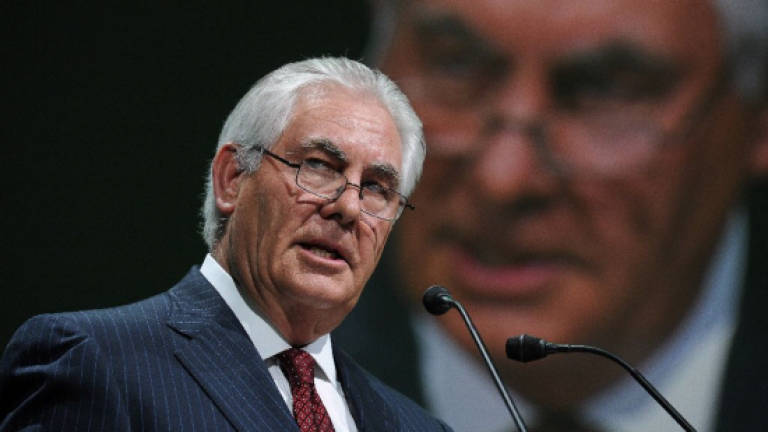Exxon's Tillerson will need to change course at state

REX Tillerson, who sealed big oil deals and developed close ties with foreign leaders around the globe as head of ExxonMobil, will have to firmly change course to serve as America's top diplomat.
Tillerson, 64, has been chief executive of the world's biggest publicly-traded oil company since 2006, and spent a career going where the hydrocarbons are. That has often meant negotiating with autocrats, and navigating in politically unstable countries or those with poor human rights records.
Tillerson's level of comfort with foreign leaders is a major source of his appeal to President-elect Donald Trump, but it is certain to draw scrutiny during his Senate confirmation hearing.
"I have a very close relationship with President Vladimir Putin," Tillerson said in February at the University of Texas at Austin.
"I don't agree with everything he is doing, but he understands that I'm a businessman. My company invested a lot of money in Russia very successfully."
But Tillerson has criticised western sanctions imposed on Russia after its invasion of Crimea, with support from the Obama administration.
Asked in a year-end press conference Friday about having a secretary of state with close ties to Russia, President Barack Obama said there will be opportunities to raise questions on Trump's appointments in the confirmation process.
"There will be plenty of time for members of the Senate to go through the record of all of his appointees and determine whether or not they're appropriate for the job," Obama told reporters.
'I am a businessman'
An engineer by training, Tillerson has represented ExxonMobil in a myriad of other politically-challenging countries like Angola, Chad, Equatorial Guinea, Iraq, Libya, Saudi Arabia and Yemen.
When abroad, Tillerson often employed the mantra "I am a businessman" to describe his mission.
"One of the things that I learned early on when I began to work overseas in foreign assignments ... is to make sure that the host governments, whether it is Russia, Yemen or the Middle East, making sure that they understand I am not the US government," Tillerson said.
"I am not here to represent the US government interests. I am not here to defend it, nor am I here to criticise it. I am a businessman."
Tillerson's record includes a decision in 2006 to keep pumping oil in Chad despite criticism from the World Bank that President Idriss Deby used petroleum earnings to finance military activities rather than for the population.
In 2009, ExxonMobil won a contract for three key oilfields in Nigeria despite offering just US$1.5 billion (RM6.7 billion), compared with US$3.75 billion bid by Chinese rival CNOOC.
That contract coup came after Tillerson personally intervened with then-president Umaru Musa Yar'Adua, a person familiar with the matter told AFP. ExxonMobil declined to comment.
In contrast, ExxonMobil took a tough line in Venezuela, opting in 2007 to exit the South American country rather than cave to demands from then-president Hugo Chavez, who re-nationalised the few oilfields that had allowed private participation in the state-controlled industry.
ExxonMobil also has boasted of access to US presidents, according to a person familiar with African petroleum interests.
Tillerson himself has said there were two instances when he communicated with the White House based on foreign contacts.
"I did it because it was a matter of national security and they did not know how to get the message to the White House," Tillerson said at the Austin gathering.
Climate change concerns
But non-governmental organisations have pointed to a host of concerns with Tillerson's new role, ranging from ExxonMobil's controversial legacy on climate change to skepticism on whether he can shift from representing a big private oil company to the broader mandate of representing the US interests on the world stage.
"What's good for Exxon is not necessarily good for America," said Zorka Milin, senior legal advisor at Global Witness.
"Oil companies don't really take public interest into account," she said. "Do we want this kind of experience as a public official? Do we trust they will put public interest first?"
And Patricia Daly, executive director of the Tri-State Coalition for Responsible Investment, cautioned that with Tillerson, "If you don't agree with him, end of story."
Daly, a Dominican nun who has been lobbying Exxon on climate change for many years, told AFP, "It's always his way." — AFP